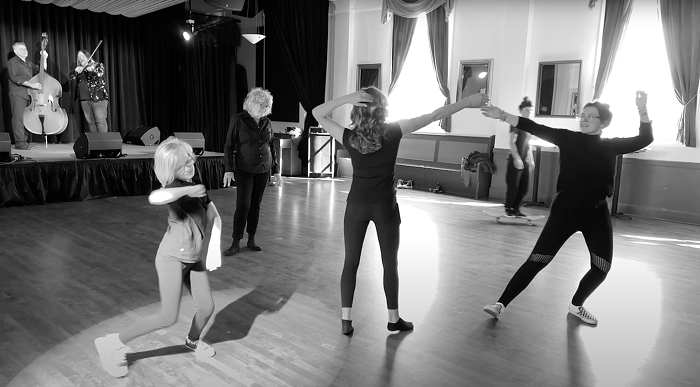
It’s become a yearly tradition: A massive David Bowie box has been released every fall since 2015, the first appearing a few months before his death in January 2016. Each one has comprehensively covered excerpts of his long career, and 2018’s installment tackles perhaps the most controversial period of all: Bowie’s glossy ’80s records, when the arty chameleon leapt into the mainstream pop world, no longer setting trends but following them, and embracing the sounds of corporate rock/dance music and trendy post-new wave production. Loving the Alien (1983-1988) collects the three albums Bowie recorded for EMI*: 1983’s Let’s Dance, 1984’s Tonight, and 1987’s Never Let Me Down. Joining them in the box are two live albums, Serious Moonlight (Live ’83) and Glass Spider (Live Montreal ’87); a collection of dance remixes fittingly called Dance; a compilation of edits, B-sides, soundtrack songs, live tracks, and further remixes called Re:Call 4; and most intriguingly, a re-do of Never Let Me Down with newly recorded instrumental tracks that were purportedly in line with Bowie’s wishes.
More so than the three previous installments, Loving the Alien (1983-1988) is really only of interest to Bowie fanatics. As popular as the Let’s Dance singles were, this is overall a pretty bad era for Bowie, with nothing as consistently good as any of his albums on RCA, the label he was signed to from 1969 to 1982 and which issued most of his classics, including his glam-rock masterpieces Ziggy Stardust and Aladdin Sane and the “Berlin” trilogy of Low, ”Heroes”, and Lodger. I’d say that across Loving the Alien's 11 CDs or 15 vinyl records is probably a single album’s worth of truly great material, which would include the three big hits from Let’s Dance, the “Absolute Beginners” single, and the remake of Never Let Me Down’s “Time Will Crawl,” which was done in 2008 with Bowie’s involvement and spearheaded the notion of posthumously redoing the whole album after his death.
Fortunately, this iffy era of Bowie-ana is presented in the best possible way on Loving the Alien. Perhaps appropriately for a period that was the most superficial of Bowie's career, the box and its contents are physically gorgeous, with the reprinted album jackets and accompanying hardback book as luxe and A-grade as reissues get. And I have been pleased to discover, or re-discover, that the music—even if it's not up to Bowie’s best standards—is really only in a few instances outright terrible. Because Bowie was never able to fully shake his uniquely wild and wonderful artistic view of the world, his attempts to swim in the mainstream remain at least partially interesting.
Let’s Dance remains a frustrating album, mostly because side one is a pop masterpiece (albeit one that’s very much of its era) while side two... isn’t. This is how many civilians still think of Bowie: blond, besuited, and beaming, with big-beat blockbusters like “Let’s Dance” and “Modern Love.” The great tracks, produced by Nile Rodgers of Chic and finding a solid direction forward for dance music in the ’80s, are still great, and the rest of the album is still peculiarly forgettable. Let’s Dance was one of the biggest hits of Bowie’s career, and it was too-hastily followed up by Tonight, an album largely bereft of new Bowie songs and often thought of as his worst. It’s got a fair share of clunkers, to be certain, including a nauseatingly slick reggae cover of Iggy Pop's “Don’t Look Down” and a diabolic version of the Beach Boys’ “God Only Knows.” But it’s mostly a charmingly throwaway slab of inoffensive pop circa 1984, with chorus'ed guitars, salsa-flavored horns, and pretty good singing from Bowie. There was a rash of retro-styled indie bands in the past few years who were striving in vain for the sounds Tonight casually tosses off. And the Tina Turner duet on the title track, often decried as a mockery of the original "Tonight" from Iggy Pop's heroin-scarred Lust for Life album, is innocently pleasant, an end-of-prom slow dance that's full of a brand of optimism you rarely get from Bowie.
Never Let Me Down was similarly dragged through the mud upon its release, but giving it a fresh listening in 2018, it’s really not as awful as its reputation. There are some abhorrent production choices, to be certain (hey, it was 1987), but Bowie was as quirky and theatrical as he’d been since Scary Monsters, doing weird voices on “Shining Star” and echoing Diamond Dogs' “Future Legend” on the grandiosely wack-ass “Glass Spider,” which is ineffably odd and hilarious. My stance (the correct one) is that Bowie being willfully weird is better than Bowie cynically making chart hits, and Never Let Me Down rewards reexamination.
You don’t really even need to delve into the box set's disappointing 2018 remake, which augments Bowie’s vocals and other elements of the original Never Let Me Down with newly recorded tracks by a collection of Bowie’s latter-day collaborators. It’s an intriguing idea but doesn’t really work, unfortunately. The great 2008 version of “Time Will Crawl” is here, thankfully, and stands head and shoulders above the rest of the redone tracks, which succeed in shaving off some of the more dated sounds of the 1987 album, but also sterilize it significantly. “Zeroes,” resting on a bed of acoustic guitars, works best in its new version, and some string flourishes on other tracks are welcome additions, but this is a weirdly unreflective, bloodless-sounding version of a flawed album, and it just made me appreciate Bowie's original all the more. Maybe, in the end, that's a win.
The live albums both suffer from flattened, distant sound, as if you’re in one of the cheap seats in the vast arenas Bowie played during this era. Glass Spider, documenting a 1987 show, is kinda cringey, too, with rapped dialogue by Bowie and his backup dancers/singers framing some of the songs, perhaps in an attempt to sound contemporary but instead coming off like a D.A.R.E. group lecturing to kids about staying positive. But in keeping with the nature of these Bowie boxes, they're indispensable artifacts of his career.
Meanwhile, sifting through the Dance collection is like reading a bunch of footnotes without the accompanying context, and will be a chore except for the most determined aficionados of ’80s dance music. The album cover they’ve come up with for Dance is genuinely eye-hurty in a way that feels period-appropriate. Lastly, the Re:Call collection of odds ’n’ sods is wildly hit-and-miss, featuring excellent tracks like “Absolute Beginners” (unfortunately appearing here in the slightly more boring full-length version as opposed to the tighter single edit) and “This Is Not America,” alongside the dreadful "Dancing in the Street" with Mick Jagger (which the UK sent to number one, a more shameful deed than Brexit), a bunch of truncated versions of Never Let Me Down tracks, and Bowie’s contributions to the Labyrinth soundtrack, which make for probably the toughest going in the entire set. There was only one good song in that movie (“As the World Falls Down”) and the rest is worse than Tonight. Sorry, '80s kids, but "Magic Dance" is cold trash.
The shortcomings of the actual music on Loving the Alien is inevitable, though: The label, Parlophone/Rhino, has committed to these massive chronological Bowie collections for better or worse, and sooner or later they had to hit the icy patches in Bowie's career. This is really the best version of the box set one could hope for, appealingly presented with lots of photos (Bowie always looked great, even if he didn't sound it) and with the studio albums sounding as good as they ever have, alongside a big chunk of period edits and remixes (although not all, which would simply add to the expense with no real added value; fascinatingly, Never Let Me Down’s “Too Dizzy” is gone altogether in accordance with Bowie’s wishes), plus the pair of live albums covering his big tours during this period. (If Parlophone/Rhino decides to continue the series, Bowie’s dalliance with Tin Machine is up next, so one wonders how they'd tackle that phase, which featured only two studio albums, a live one, and a similar dearth of top-shelf material.) I'll repeat myself and argue that a single-disc distillation of Bowie's '80s period could really be a worthwhile product for casual fans—it's totally doable to make your own on the streaming services, I guess—but for the Bowie-possessed and -obsessed like me, Loving the Alien (1983-1988) is yet another heavy museum piece to strain our shelves. We wouldn’t have it any other way.
*Confusingly, EMI later reissued a big swath of Bowie’s back catalog originally released on RCA. Even more confusingly, this current box is on the Parlophone imprint, which was once famously part of EMI (they released all the Beatles' records) but is now part of Warner Music Group. Don’t attempt to research the ins and outs of this, like I did; it will give you a headache.



















